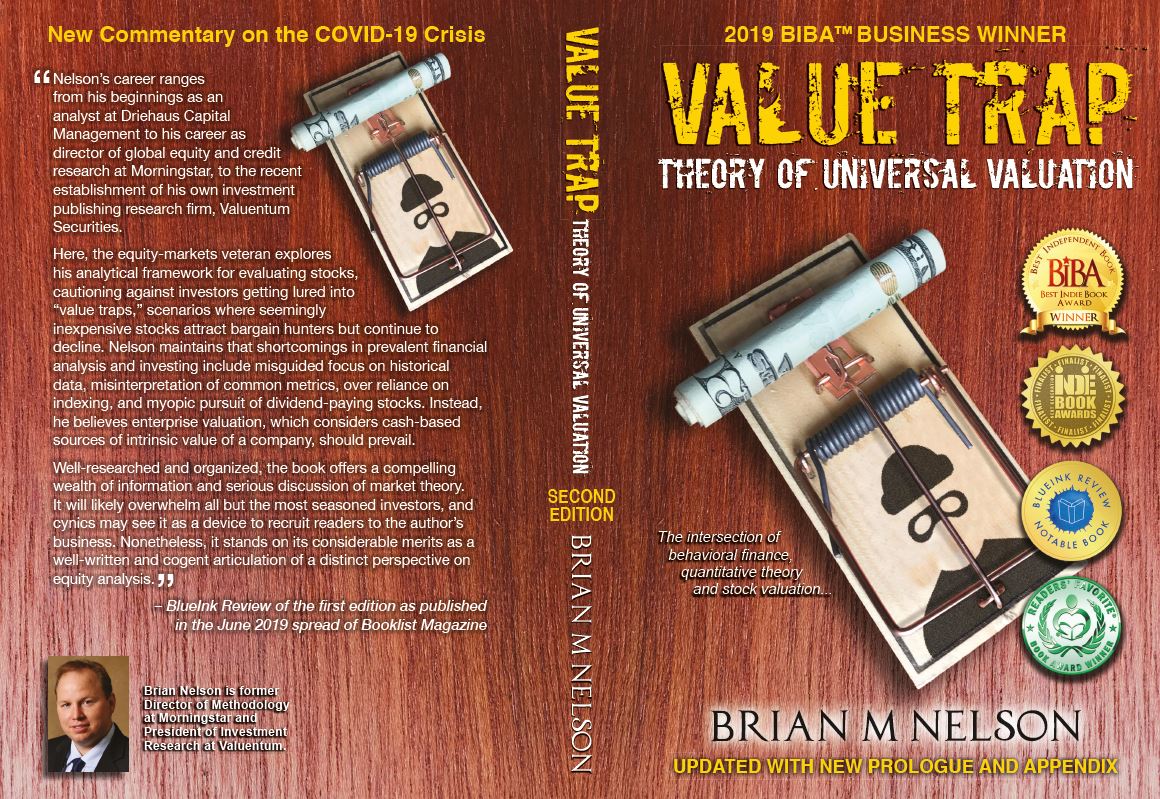—
In investing, it’s okay to admit that there are some things that investors can’t know. It’s not a poor reflection of one’s analytical ability or a possible shortcoming of one’s experience, but rather quite the contrary: Understanding and accepting that some things are “unknowable” is a sign of the quality of one’s judgment.
—
Quite simply, certain critical components of the equity evaluation process are more “unknowable” than others. The intelligent investor recognizes the variance (fair value estimate ranges) and the magnitude of the “unknowable” between companies and generally tries to identify entities that have the least “unknowable” characteristics as possible or situations where the “unknowable” might actually be weighted in their favor (an asymmetric fair value distribution).
—
For example, trying to predict a turnaround at Carvana Co. (
CVNA) or the result of “forever chemical” litigation at 3M (
MMM) may be largely a fool’s errand with a huge range of possible outcomes. For one, Carvana’s fundamentals are in free fall and its cash-burn is tremendous, while legal settlements could get very expensive and become large distractions for 3M’s management.
—
In perhaps another example, assessing what may happen with healthcare laws next election, let alone 2030, may make many individual entities in the healthcare space difficult to value. Further, what may happen to the yield curve, securities portfolios, and loan loss reserves through the course of what looks to be a coming recession almost precludes banking (
KBE,
KRE) ideas for consideration. Look at what just happened to SVB Financial (
SIVB), for one. The banking business model works until it doesn’t.
—
How well General Motors (
GM) will compete against Tesla (
TSLA) in the next 20 years is at best a coin toss, while the path of the price of crude oil (
USO) or gold (
GLD) prices–not to mention cryptocurrency–is nearly impossible to predict with any sort of precision. There are some things that can influence commodity prices one way or another, and for every investor that thinks crude oil will be over $100 next year, another investor might believe it will be under it. No matter what a mining entity’s cost structure, their economic profit is going to be impacted by the price of the rocks and minerals they pull out of the ground.
—
How should you think about these types of companies? Warren Buffett and Charlie Munger put stocks that fall into this “unknowable” category in the “Too Hard” pile or “Too Hard” bucket. It is extremely important for you to have your own “Too Hard” bucket, too, and it should be large. Jason Zweig writes in Your Money and Your Brain:
—
…your investing workspace should have a small “In” box with a handful of ideas to consider, a little “Out” box holding another few ideas you’ve already approved or rejected–and an enormous “Too Hard” pile for everything else.
—
Brian here. I’m not talking about a “Too Hard” pile of 50% of companies you’ve looked at; I’m talking 90%, or perhaps maybe 99%!
—
In my opinion, there are probably 100-150 stocks in our coverage of hundreds and hundreds of stocks that meet the qualifications to be in your “In” box. The rest may fall into a “Too Hard” pile. In our “Too Hard” pile, for example, we put most of the energy sector–including metals, mining and chemical companies–as well as many banks and financials (including insurance), and a large number of “old economy” names, including General Motors and 3M, as examples.
—
We’re not going to pretend that we know what will happen to healthcare laws in 2030, and for certain situations like this, we like broad-based exposure to healthcare as in the Health Select Sector SPDR (
XLV). We may stretch into the “Too Hard” pile for yield and income at times, but we’re knowledgeable of the many incremental risks of doing so.
You should be aware of them, too.
—
We think most of the market agrees with our assessment regarding many of the “Too Hard” sectors, too. Energy (
XLE) and financials (
XLF) were among the worst-performing sectors the past decade or so (Energy did lead during 2022, however, but that may be short-lived). “Old economy” names such as General Motors and 3M remain largely out of favor, and the market continues to prefer ideas in the Best Ideas Newsletter portfolio and Dividend Growth Newsletter portfolio–and for good reason.
The names in the newsletter portfolios are rather easy to understand, have strong balance sheets, considerable future free cash flow potential, excellent visibility into their growth prospects (recurring revenue models) and competitively advantaged operations. —
The riskiest types of companies should be in your “Too Hard” pile, and you might find these are companies that have those “tricky” low earnings multiples–and all the makings of value traps (perhaps their products are in secular decline, or they have a massive net debt position). These low P/E companies aren’t cheap; they’re just riskier with more “unknowable” aspects to their business models. For every Apple or Alphabet in your “In” box, there should be 50-100, or more, in your “Too Hard” pile.
Our brains on autopilot might try to lure us into the low P/Es across some of these “Too Hard” sectors, but our experience, judgment, and “slow thinking” might instead point to big cap tech and large cap growth as where the true long-term bargains might be had. These areas, to little surprise, have heavily outperformed the past couple decades.
—
There are “unknowable” aspects to many names in our “In” box, too, but we try to keep the degree of the “unknowable” as small as possible, and we weigh the upside of the “unknowable” with the potential downside. For example, we might fully accept the “unknowable” aspect of whether Meta Platforms or Alphabet might be broken up due to antitrust measures because this could potentially be another catalyst for upside (as the market is forced to value the company on a sum of the parts basis). On the other hand, the upside for many “zombie” companies in the disruptive innovation (unprofitable tech) space may not be much, and the “unknowable” in this case might be more heavily weighted to the downside. Where possible, we prefer the “unknowable” to be weighted to the upside.
—
The role of luck will always play an important role in any investment outcome, but in my view, when it comes to stocks in your “In” box, they should be ones with strong net cash positions, solid expected future free cash flows, impressive competitively-advantaged business models with strong visibility into future growth (and dividend/income potential, where applicable). As in the nature of fat pitch investing, you don’t have to swing at every pitch, or concern yourself with companies in the “Too Hard” pile. If something has a huge net debt position or doesn’t generate sufficient free cash flow to comfortably cover its dividend, put it in the “Too Hard” bucket and move on. Treat your “In” box mostly to companies in the newsletter portfolios for consideration.
—
Whatever path you take, however, your “Too Hard” bucket should nonetheless be enormous!
—
 Dear members:
Dear members:
